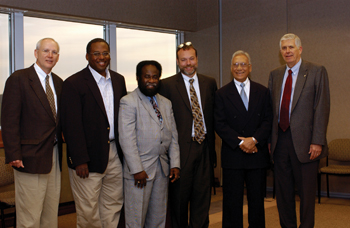
From left, Raymond DuBois, M.D., Ph.D., director of Vanderbilt-Ingram, Steven Stain, M.D., professor and chair of Surgery at Meharry, Samuel Adunyah, M.D., chair of Biochemistry at Meharry, Jeffrey R. Balser, M.D., associate vice chancellor for Research at VUMC, Baqar Husaini, Ph.D., professor and director of the Center for Health Research at TSU, and Harold Moses, M.D., director emeritus of Vanderbilt-Ingram, celebrate being the only partnership in the country working to reduce cancer-related health disparities to be given grant renewal from the National Institutes of Health.
photo by Mary Donaldson
Grant bolsters cancer disparities partnership
The partnership between Vanderbilt-Ingram Cancer Center and Meharry Medical College aimed at reducing cancer-related racial disparities has landed a $10 million grant renewal from the National Institutes of Health, the only such site honored.
The funding is known as the U54 grant. The current grant runs out in April 2006, when this renewal, totaling $10 million over five years will take effect. Vanderbilt-Ingram and Meharry received the total amount they requested, having earned an outstanding score in the NIH reviewal process.
“We learned there was a big spread between our score and the other sites who applied for funding again this year. As a result, the NIH felt like they could fund only one; us,” said Harold Moses, M.D., director emeritus of Vanderbilt-Ingram and co-principal investigator on the project.
Raymond DuBois, M.D., Ph.D., director of Vanderbilt-Ingram, said he is proud to know the program earned such high marks. “Clearly we have one of the best interactions of institutions and arrangements around the country,” DuBois said.
The grant renewal will allow both institutions to continue to build upon the existing relationship, combining the strengths of a historically black academic health center with the expertise of an NCI-designated Comprehensive Cancer Center.
“Meharry is able to enhance cancer research and infrastructure through recruitment of new faculty members and elaborate on the partnership with Vanderbilt-Ingram to use their research expertise,” said Samuel Adunyah, M.D., chair of Biochemistry at Meharry and co-principal investigator on the grant. “Over the last several years this funding has allowed us to create the Clinical Trials Clinic at Meharry from ground zero. We have 14 new faculty members, basic scientists, epidemiologists and three oncologists; where we had none before,” added Adunyah.
Adunyah said the partnership allows both institutions to reach out to African-Americans and other minorities in the fight against cancer. To continue to strengthen those efforts, Tennessee State University is becoming a member of the collaboration. “We were delighted to bring in TSU,” said Moses.
Baqar Husaini, Ph.D., professor and director of the Center for Health Research at TSU, said his institution has been partnering with Meharry for a long time, but this marks the first time they've joined forces with a cancer center.
“All of my work has been in the minority population. I think this will be a very good asset to improve the quality of life and reduce disparities and cancer mortalities. It is a pleasure to be working with Hal and his team,” said Husaini.
Husaini said most of the work through the grant has focused on the bench side, or in the labs, but he hopes to take the partnership to the people. “My work is to bring the folks into the health care system, because they can't benefit from this great work being done if we can't bring them in,” said Husaini.
With the increased cancer incidence among African-Americans it becomes even more crucial that minority patients are educated about clinical trials and enrolled in investigations to help advance technology and treatments to address the issue. It's long been documented that minority participation in clinical trials is low to non-existent.
“They have had a long history of distrust,” explained Husaini. “So a lot of resentment shows up here. They have been staying away from clinical trials. But as we begin to make inroads into the community, we can overcome that distrust,” said Husaini.
Adunyah and Moses agree that this partnership was chosen for funding renewal above all others based on results. “We made a lot of progress. We have good people who are cooperative. We've been very efficient,” said Moses.
Adunyah echoed those comments. “We've been productive. We did almost all the things we said we'd do. We have had outstanding leadership from Dr. Moses. He's passionate and that plays a role,” said Adunyah.
Looking to the future, Adunyah said he hopes this grant will take the partnership even further. “Within five years we hope to strengthen cancer research infrastructure at Meharry and move to the next level of reducing cancer death rates and incidence in Davidson County and this area,” declared Adunyah.













